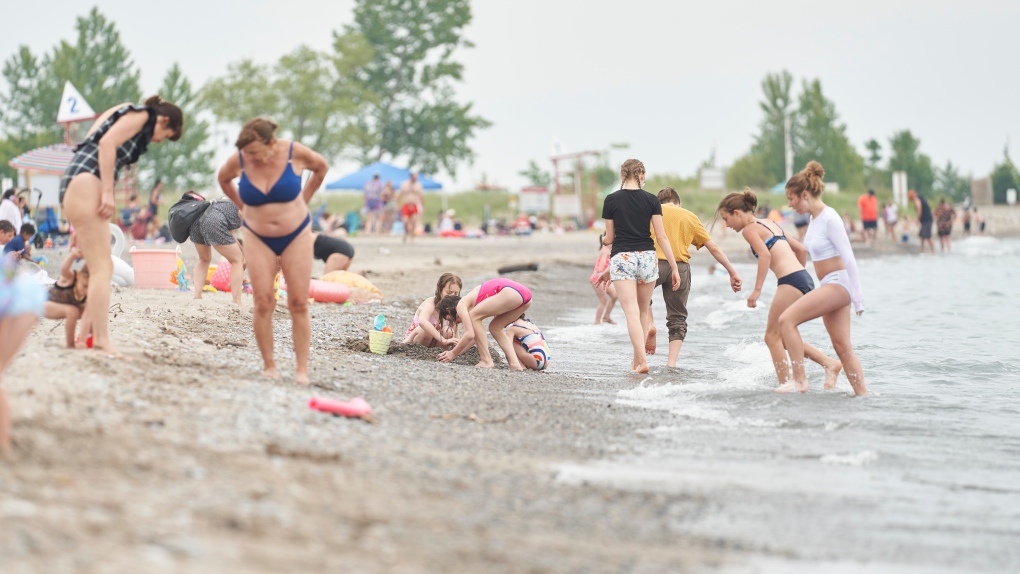Ontario's staycation tax credit is now in effect and this is how it works
Ontario's staycation tax credit for 2022 is now in effect.
Anyone planning a getaway within the province in 2022 could be eligible for a tax refund under the new "Ontario Staycation Tax Credit" program.
Ontarians can get a 20 per cent personal income tax credit on eligible accommodation between Jan. 1 and Dec. 31, up to a maximum of $1,000 for an individual and $2,000 for a family, for a maximum credit of $200 or $400 respectively.
Ontario residents can apply for this refundable credit when they file their 2022 personal tax returns and benefit even if they do not owe any tax.
 Ontarians should expect to see a mix of wet and warm weather this summer. (The Canadian Press)
Ontarians should expect to see a mix of wet and warm weather this summer. (The Canadian Press)
According to the government, an eligible accommodation expense has to be:
- For a stay of less than a month at an eligible accommodation such as a hotel, motel, resort, lodge, bed-and-breakfast establishment, cottage or campground in Ontario
- For a stay between Jan. 1 and Dec. 31 of 2022
- Incurred for leisure
- Paid by the Ontario tax filer, their spouse or common-law partner, or their eligible child, as set out on a detailed receipt
- Not reimbursed to the tax filer, their spouse or common-law partner, or their eligible child, by any person, including by a friend or an employer
- Subject to Goods and Services Tax (GST)/Harmonized Sales Tax (HST), as set out on a detailed receipt.
The government said this tax credit will help the tourism and hospitality sectors recover and encourage Ontarians to explore the province.
The credit could provide an estimated $270 million to support over one-and-a-half million families to further discover Ontario, the government said.
CTVNews.ca Top Stories

opinion Tom Mulcair: Prime Minister Justin Trudeau's train wreck of a final act
In his latest column for CTVNews.ca, former NDP leader and political analyst Tom Mulcair puts a spotlight on the 'spectacular failure' of Prime Minister Justin Trudeau's final act on the political stage.
B.C. mayor gets calls from across Canada about 'crazy' plan to recruit doctors
A British Columbia community's "out-of-the-box" plan to ease its family doctor shortage by hiring physicians as city employees is sparking interest from across Canada, says Colwood Mayor Doug Kobayashi.
'There’s no support': Domestic abuse survivor shares difficulties leaving her relationship
An Edmonton woman who tried to flee an abusive relationship ended up back where she started in part due to a lack of shelter space.
opinion King Charles' Christmas: Who's in and who's out this year?
Christmas 2024 is set to be a Christmas like no other for the Royal Family, says royal commentator Afua Hagan. King Charles III has initiated the most important and significant transformation of royal Christmas celebrations in decades.
Baseball Hall of Famer Rickey Henderson dead at 65, reports say
Rickey Henderson, a Baseball Hall of Famer and Major League Baseball’s all-time stolen bases leader, is dead at 65, according to multiple reports.
Arizona third-grader saves choking friend
An Arizona third-grader is being recognized by his local fire department after saving a friend from choking.
Germans mourn the 5 killed and 200 injured in the apparent attack on a Christmas market
Germans on Saturday mourned the victims of an apparent attack in which authorities say a doctor drove into a busy outdoor Christmas market, killing five people, injuring 200 others and shaking the public’s sense of security at what would otherwise be a time of joy.
Blake Lively accuses 'It Ends With Us' director Justin Baldoni of harassment and smear campaign
Blake Lively has accused her 'It Ends With Us' director and co-star Justin Baldoni of sexual harassment on the set of the movie and a subsequent effort to “destroy' her reputation in a legal complaint.
Oysters distributed in B.C., Alberta, Ontario recalled for norovirus contamination
The Canadian Food Inspection Agency has issued a recall due to possible norovirus contamination of certain oysters distributed in British Columbia, Alberta and Ontario.


































